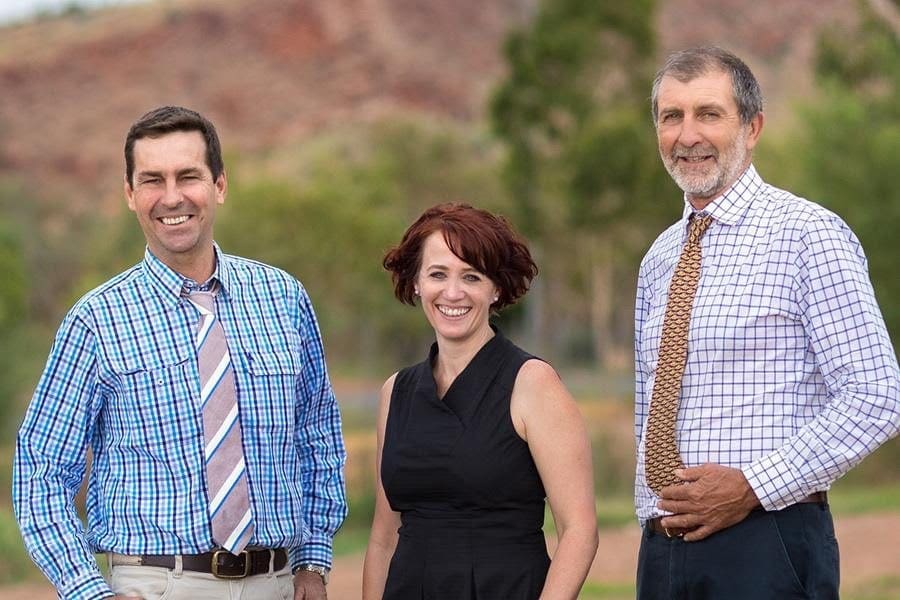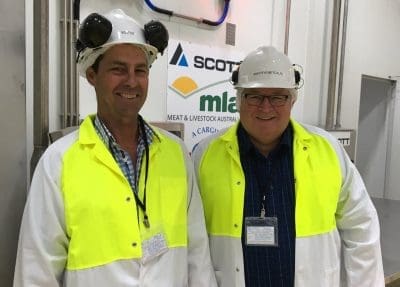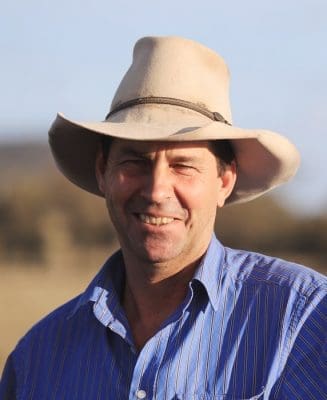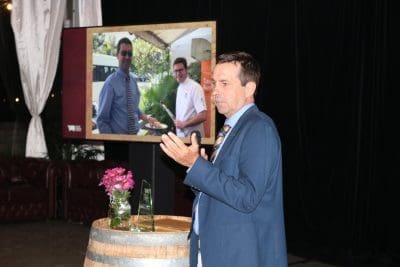
Howard Smith, CEO Margo Andrae and NSW CCA director Tony Hegarty, pictured at the 2017 CCA AGM at Alice Springs last November.
AS Howard Smith was stepping up to the Cattle Council presidency four years ago, the peak industry council was taking its first steps towards opening up its membership to producers who were not paying members of State Farm Organisations for the first time.
The peak industry council representing Australian cattle producers had also just expanded its board to include two new independent board members, in addition to the eight State Farm Organisation appointed board members.
Four years later, as he finishes his four year term as president, those changes are on track to be continued, with a proposal to further open the council’s activities to direct members to be presented to CCA members at its annual general meeting in Canberra today.
More details explaining the draft proposal are expected after today’s AGM but it’s understood the model will see each of the State Farm Organisations, which represent an important component of Cattle Council’s revenue base through their annual membership fees to the body, continue to appoint one representative each to the CCA board.
In addition each State would also have a directly elected seat on the board for which any CCA member from that State could nominate to stand for.
The proposal follows years of restructure discussions and negotiations and is designed to find a balance between ensuring all producers who want to have a say in industry affairs and levy expenditure are able to, but in a structure that is sustainably funded for the future.
A key problem with all previous attempts at developing a new model for national grassfed cattle representation has been how to fund the process going forward.
It is one thing to establish a new body that allows growers to directly elect representatives for their own region, but another to be able to pay for that process long-term.
Many in the industry had hoped and believed that a share of the $5 per head cattle transaction levy should be siphoned towards funding such a process to allow levy payers to elect their own representatives to a national board, but that option has been routinely ruled out by the Federal Government.
“Democracy is not cheap,” Mr Smith said.
“We have always been looking at how to move forward with Cattle Council and how to make it more open and transparent and democratic.
“The trick as always with these things is that getting the model is the easiest thing, how you fund it is the challenging thing.”
Mr Smith said it is still his personal belief that a portion of the levy should be directed to supporting peak industry councils in the work they do which benefits of all levy payers, whether they pay membership fees to support their work or not.
He said organisations must be “kept lean and mean” but there was no reason why a small percentage of the levy should not be used to help fund peak councils and to ensure levy payers have a voice.
“To be frank we were promised and promised and promised (through the restructure implementation committee process started by Barnaby Joyce) that funding was coming and for four years we were just drip fed.
“We delivered a structure to the Minister that we all agreed on, I think his quote at the time was ‘what’s next, peace in the Middle East’?, but we actually got that across the line.
“Then we tried to work out a funding mechanism and I think most of us agreed a portion of the levy would have been the way to go.
“So it was disappointing the amount of time and effort and resources that have gone into getting to that point and there was no political will, and basically at the end of the day we couldn’t keep pursuing that.
“So we have to keep moving forward, and the trick will be getting that balance where you have a sustainable funding model so the industry.
“Democracy is not cheap, you don’t want to give people false hope and say we’re going to do this and get to the point where you say there is no money to execute it.”
CCA progressing with its own restructure
Minister for Agriculture David Littleproud last week said the Government will only pay a $500,000 grant which was allocated to the grassfed cattle restructure process through the industry leadership fund last year if Cattle Council of Australia and Cattle Producers Australia unite.
Mr Smith said that after trying to jump through hoops to satisfy Government conditions only to find more hoops then put in their way, Cattle Council has decided to move forward on its own and continue with its own restructure process.
“Initially there was going to be millions of dollars allocated to the grassfed restructure, and then everybody grabbed for it and we ended up with a pocket full of silver really,” he said.
“There were certain protocols the money could only be used for and a lot of constraints with it, we have been told many stories but quite frankly I personally believe they can have their money and CCA should go its own way.
‘We’re getting on with the restructure, we’re not going to sell our soul for a pocket for full of silver’
“We’re getting on with the restructure, we’re not going to sell our soul for a pocket for full of silver.
“Cattle Producers Australia, good luck to them, I have always wished them well, if they want to keep going down the track of pursuing something that is up to them.
“Last time I looked we still represent a significant amount of beef producers through our SFO membership and others.
“The trick is trying to fund it so everybody can get a vote, and with this new draft model I think that is what we will achieve.
“We have got to change, we have to keep constantly improving and going forward and making sure Cattle Council is well financed going forward.
“It is something I am proud that we’re progressing toward, I think we all want the same thing, it is how we get there.”
Change takes time, but its worth persisting with
Four years ago as he was preparing to take on the role of Cattle Council of Australia president, Mr Smith commented to Beef Central that “change takes a long time in agriculture”.
But it was worth persisting with, because, occasionally, the long hours, the time away from home, the inevitable criticism from naysayers, were justified by outcomes that delivered excellent results for industry.
The creation of the Pasturefed Cattle Assurance Scheme was one clear example. At least a decade of lobbying by several grassfed producers including Ian McCamley, Greg Brown and Howard himself was one of those game-changers that allowed grassfed beef to be recognised as a premium product and producers to be paid a premium price.
Another achievement in the past four years was the role Cattle Council of Australia played in working with Government to negotiate improved market access conditions for Australian beef through Free Trade Agreements negotiated with several key markets including South Korea and Japan.
Industry has an exciting future
Mr Smith’s retirement from the Cattle Council of Australia presidency today brings to a close 14 years of active industry representation since he was elected to the AgForce cattle board in 2004. He served as AgForce cattle president for two years before being elected to the CCA president’s role four years ago.
The roles are unpaid and voluntary with a full-time workload that virtually requires the employment of a full time staff member to cover for the absence at home.

Howard Smith with EY Australia’s Andrew Metcalfe at Teys Australia’s Rockhampton plant in late October.
“I have been fortunate that I have a family that is understanding in that respect, and I am happy to be going home now and have a few things going forward now with my own enterprise.”
He said he had been very fortunate to see a level of the industry many producers don’t get to see and from that exposure he believes the industry has many exciting times ahead in terms of innovation and change.
“I went to Teys Lakes Creek at Rockhampton recently and saw some of the things that are going on there, and what that company is doing and other things that are happening in that space, it is so important for the industry to embrace.
“We need to be the most innovative, efficient industry we can if we’re going to survive going forward in the future. We can’t go back to the 1950s like some people want us to do (in terms of reducing investment in industry integrity systems, we’re in the food business.
“I think we’re in some exciting times, also challenging, but going forward I am excited by the future for our industry.”


